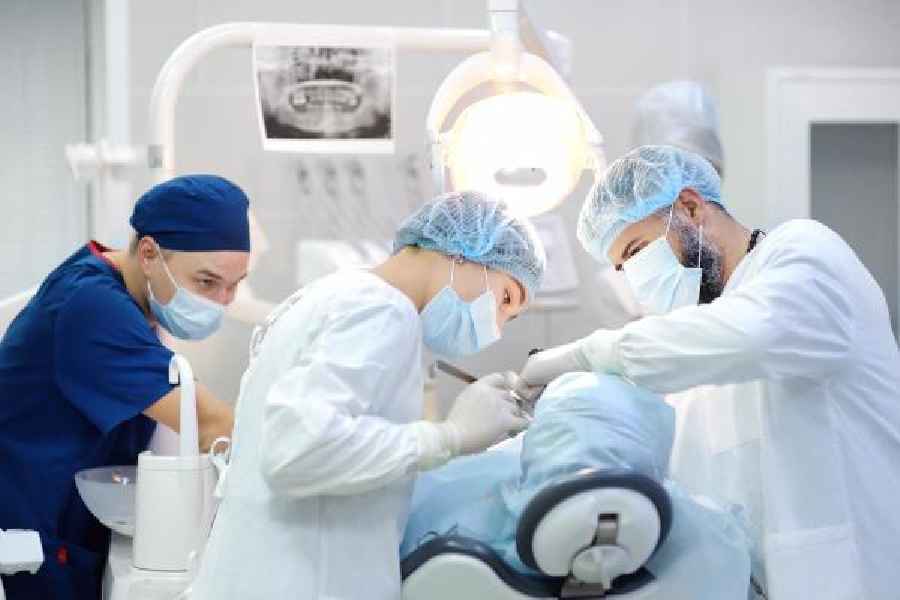The mouth is the gateway to the human body and the dentist plays a major role in preventing adverse general health conditions originating from the mouth. A healthy lifestyle involves physical, mental and emotional well-being. A combination of sedentary workplaces, stress, gadget addiction and poor food choices have driven us, as a society, towards a plethora of lifestyle diseases like diabetes, hypertension, obesity and cardiovascular risks.
In addition to lifestyle conditions, there are various congenital, developmental and physiological states that affect our ability to undergo common medical procedures in a safe manner. Dental procedures are extremely common and most of them are performed as an outpatient department (OPD) facility. Any altered medical state can affect safe delivery of dental care.
The dentist often walks the tightrope of providing efficient and timely oral care in a safe manner. Meticulous preparation, patient awareness, close communication with treating physician and modification of regular treatment protocols may have to be implemented to ensure a smooth and secure oral and dental surgery.
The following conditions require alteration in standard method of dental care. Quality dental centres are equipped with emergency kits to address immediate medical concerns and prevent any untoward incidents.
DIABETES
Diabetes weakens the immune system and individuals may experience delayed wound healing, including oral wounds after dental procedures. This can increase the risk of post-operative complications, such as infection or prolonged recovery time. Fluctuations in blood glucose levels can occur during dental treatment, particularly for patients with poorly controlled diabetes. Stress, pain, and anxiety associated with dental procedures can contribute to uncontrolled blood sugar levels.
Procedures that require long appointments can increase the risk of hypoglycaemia (low blood sugar) in diabetic patients who are taking insulin or oral medications. It is ideal to inform the dentist about all the diabetic medications being taken and schedule the dental appointment in the morning. It is imperative that one shouldn’t skip a meal before a dental appointment.
Diabetes can contribute to oral health issues such as higher risk of gum disease, oral candidiasis (fungal infection), dry mouth and impaired taste. Close monitoring of blood glucose levels and stress reduction techniques such as relaxation exercises may also help maintain sugar control during dental procedures.
The HbA1c (glycosylated haemoglobin) test is a critical component of assessing the quality of patients’ glycemic control over the long term and it should ideally be below 7 for smooth dental care. Diabetics should maintain meticulous oral hygiene with the help of regular brushing, flossing with a water flosser and annual professional cleaning of gums and teeth.
HEART-RELATED ISSUES
Cardiac conditions can have implications for dental care due to the potential risks associated with certain dental procedures. It’s important to inform the dental professional about all past and present cardiac conditions, procedures done and medicines being taken.
Hypertension (high blood pressure): Uncontrolled high blood pressure can increase the risk of bleeding during dental procedures. Medications used to manage may interact with certain drugs used in dentistry.
Coronary Artery Disease: Patients with coronary artery disease may have reduced blood flow to the heart, which can increase the risk of complications during dental procedures. Stress reduction protocols, such as prescribing anti-anxiety medications or hospital-based dentistry, may be necessary to minimise cardiac strain during dental visits.
Heart Failure: Heart failure can result in reduced cardiac output, leading to fatigue and difficulty breathing. Patients with heart failure may require shorter dental appointments to minimise stress on the cardiovascular system.
Prosthetic Heart Valves: Patients with prosthetic heart valves may require prophylactic antibiotic therapy before dental procedures to prevent infective endocarditis, an infection of the heart lining or valves.
Stroke or Transient Ischemic Attack (TIA): Patients who have had a stroke or TIA may require special considerations during dental care. Particular attention should be paid to their ability to lie flat and the potential for compromised swallowing or speech.
BLEEDING DISORDERS
People with bleeding disorders like haemophilia and Von Willebrand disorder need meticulous work up to prevent bleeding issues during and after dental procedures. In addition, there are various other conditions that can lower platelet count and needs to be carefully managed.

Dr Kamlesh Kothari
If the patient has a known bleeding disorder or if there are concerns about their bleeding risk, it is advisable to consult with their haematologist or primary care physician who manages their bleeding disorder first who would provide essential guidance on the specific dosing, timing, and type of clotting factor concentrate to use.
A specialised dentist such as an oral and maxillofacial surgeon should ideally be treating such situations. The following factors need to be considered:
Updated Laboratory Tests: Request recent laboratory tests, including complete blood count (CBC), bleeding time, clotting time, and coagulation profile (PT, aPTT, INR), to assess the patient’s current bleeding status and determine the appropriateness of specific treatment interventions.
Treatment Timing: Schedule dental procedures during periods of maximum clotting factor activity, if possible. In certain bleeding disorders, there may be specific times or days when the patient’s clotting factors are at their peak, reducing the risk of excessive bleeding.
Gentle Techniques and Instruments: Utilise gentle and minimally invasive treatment techniques to reduce tissue trauma and minimise the risk of bleeding imperative and the role of an experienced surgeon and aseptic technique is crucial. The dental office must be fully equipped and be prepared to manage potential bleeding emergencies.
RENAL CONDITIONS
Patients with compromised kidney function need to be managed with respect to the timing of treatment and medication choice to prevent any further damage to their renal function. A close communication between the treating dentist and the nephrologist helps in smooth treatment. Patients with renal conditions are prone to anaemia, risk of bleeding, susceptibility to infection and kidney damage due to medication side effects.
Medication Review: Certain medications used in dental procedures, such as antibiotics or painkillers, may need to be adjusted or avoided in kidney-compromised patients. If you are on dialysis, schedule your dental appointment on a non-dialysis day or right after your dialysis session. Heparin, administered during dialysis, may cause bleeding. Recent kidney transplant patients are at higher risk of infection due to medications given to prevent rejection.
Monitoring Vital Signs: Dental treatments may cause stress or anxiety, which can affect your blood pressure. Ensure that your blood pressure is monitored before, during, and after the procedure, especially if you have hypertension or other cardiovascular issues.
CANCER AFFECTED PATIENTS
Cancer can be debilitating and both the disease and treatment of it can cause compromise of the host defence. Various treatment modalities (surgery, chemotherapy, radiation therapy, immunotherapy, etc.) are deployed to control cancer and their potential side effects or complications may affect dental treatment. The psychological aspects of these have an impact on everyday life.
Strict infection control protocols to minimise the risk of infections are critical, especially in patients with compromised immune systems due to chemotherapy. Patients with oral cancer may need radiation to the jaws and teeth removal before the surgery. If the teeth are to be removed after the radiation, the timing and technique are important to prevent a condition called osteoradionecrosis (jaw damage due to decreased blood supply).
Radiation-induced dry mouth and mucositis can cause an oral burning sensation and make the teeth vulnerable to dental caries. Regular dental visits to manage dental caries, salivary supplement mouthwashes and dietary modifications (reduced sugar) are necessary.
Burning mouth can be a long-term issue for the patient to manage. Hot and spicy foods will need to be avoided. Pain management, fluoride application, regimented oral care at home and inter-disciplinary medical care go a long way to helping cancer patients deal with their dental issues and disease per se.
PREGNANCY AND ORAL CARE
While pregnancy is not strictly a medically compromised condition, there are certain factors which make managing dental issues during pregnancy challenging. During pregnancy, many complex physiological and hormonal changes occur in women’s bodies that can adversely affect oral health.
The developing foetus and the additional stress on the mother’s body make non-emergency dental procedures during the first and third trimesters risky. X-rays would have to be avoided during pregnancy (especially in the first trimester). Shorter dental appointments, proper positioning on the dental chair, judicious usage of medication and close coordination between the dentist and the gynaecologist are important.

Treating pregnant women would need to take into account the altered state of her body condition during this period.
The link between pregnancy and gingivitis (bleeding gums) probably stems from the surging hormonal changes (progesterone and estrogen) that accompany each pregnancy. The immune system also goes through alterations to accommodate the new, independent, and growing co-habitant. These changes increase the blood flow through the gums, which makes them more sensitive and swollen.
Sometimes a ballooning overgrowth of tissue, called a pregnancy tumour, appears in the gums of pregnant women, usually during the second trimester. These tumours are benign, that is, not cancerous. While pregnancy gingivitis can occur anytime between the first and third trimester, it’s usually most severe during the second trimester.
Gingivitis and periodontitis (gum disease) are linked to adverse pregnancy outcomes like pre-term birth and low birth weight. Proper oral hygiene and dental assessment help in keeping problems at bay. Because the hormonal changes disrupting dental health are linked to pregnancy, these oral health problems are likely to vanish soon after childbirth.
Dr Kamlesh Kothari is an oral and maxillofacial surgeon with a special focus on advanced dental and maxillofacial implantology. He isthe director of Aesthetica — Dental Implant Clinic at Vasundhara, 2/7 Sarat Bose Road, Calcutta. He can be reached at 9830183000, drkamleshkothari@gmail.com or www.aesthetica.co.in










